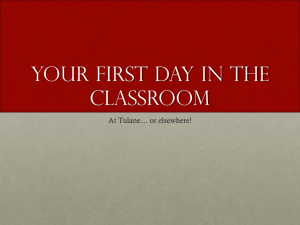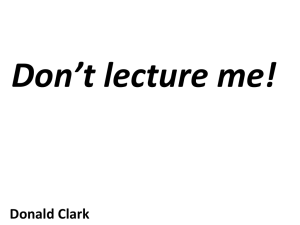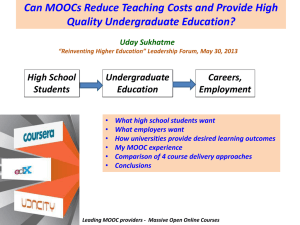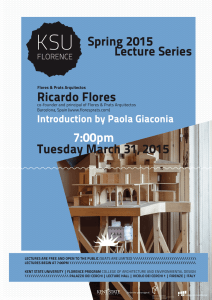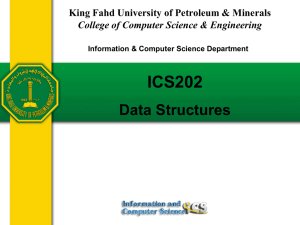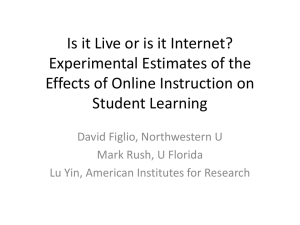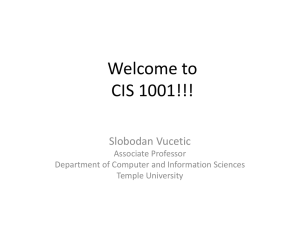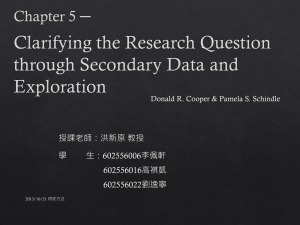论文开题报告的写作与答辩
advertisement
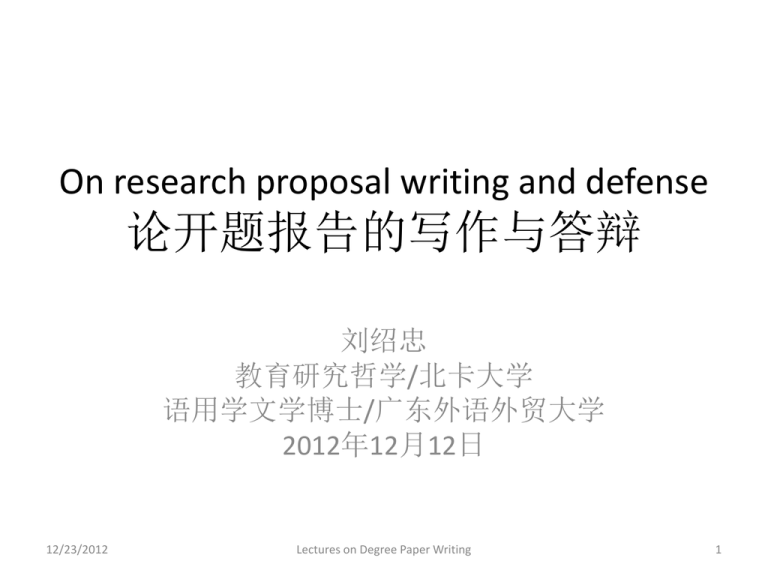
On research proposal writing and defense 论开题报告的写作与答辩 刘绍忠 教育研究哲学/北卡大学 语用学文学博士/广东外语外贸大学 2012年12月12日 12/23/2012 Lectures on Degree Paper Writing 1 什么是开题报告? 1。教育意义 1)开题报告,是本科生教育阶段的一项重要知 识内容和技能训练环节,是未来公民和领袖所 必须具备的学术素养和独立地和创造性地工作 的基本本领。 2)高级人才不仅要善于学习知识,而且责无旁 贷地生产知识。学习和生产都离不开研究。 3)通过开题报告的写作,学会谦虚、谦卑、敬 重他人、尊重知识、诚实做人。 4)通过开题报告的写作,进一步调整学习计划、 方法和策略;深深体会“终生学习”的重要性 和必要性。 12/23/2012 Lectures on Degree Paper Writing 2 2。管理意义 1)本科生阶段的教育和学历,是人类迄今为止 可以为公民所提供的最正规和最好的教育和学 历之一。 2)对个人和培养单位来说,开题报告是保证扩 招后教育教学质量的一种有效的管理机制。 3)立志拿下学士学位的学生不仅是学习的主人, 更是读书和做学问的主人。作为主人,每人可 以也应该追求个性化的成才计划,包括修什么 方向?修哪些课程?何时完成学业?等等。对 培养单位来说,多培养人才,快速培养人才, 培养好人才,是一条基本的信条。 12/23/2012 Lectures on Degree Paper Writing 3 4)通过开题报告的写作,学会管理时间,提升 与学者交际的能力,学会建立和经营社会和人 际关系。 5)通过开题报告,发现个体间的差异和因材施 教、因材施导的意义,因而鼓励学生在学术上 的竞争,通过竞争来激励学生奋发向上,快速 成长。 6)学院今后会采取“成熟一个,开题一个”的 办法,不搞一哄而起的计划性开题。同样,对 开题后的论文,也采取“完成一个,答辩一个” 的办法,从根本上调动大家的积极性和自觉性。 7)开题和答辩公开化和学术报告化,以海报的 形式公示,以学术演讲形式展开,给学生更多 的学术锻炼和提升自己知名度的机会。 12/23/2012 Lectures on Degree Paper Writing 4 3。方向意义 1)以学士学位论文为目的的开题报告,是 本科生第一次正式地向学术界宣告自己已 经积淀的学术兴趣和准备攻克某个领域难 题的学术志向的宣言书。一般而言,这个 宣言书,可能会影响一个人的今后若干年 甚至一辈子的学术研究。 2)开题报告会上,导师们(往往是今后论 文答辩的主要成员)会对学生的选题及研 究设计提出各种建设性的思想,这是学生 一次难得的学习机会,甚至可以说是本科 生阶段结束前除了答辩外最后一次较好的 学习机会,每个人一定要珍惜这次机会。 12/23/2012 Lectures on Degree Paper Writing 5 3)正是由于这是一次有培养单位的教授们 向学生指导的机会,老师们的集体意见, 就是今后学生做论文的路线图和一份很严 肃的学术合同,原则上不能再改动。一般 情况下,改题、改方向必须重新开题。 4)开题报告通过后,论文写作的工作大致 得了三分之一。正因为这样,导师和学生 会为此而高兴,因为师生前期的合作已经 在小范围内得到同行们的肯定。 12/23/2012 Lectures on Degree Paper Writing 6 开题报告答辩怎么写? • • • • • • • 开题报告的组成部分: 开题报告的内容一般包括: 1)题目 2)提要 3)立论依据 4)研究方案 5)条件分析 12/23/2012 Lectures on Degree Paper Writing 7 • 以上5项内容,将基本与论文终稿的以下部分 对应: • 1)Title (题目及封面页) • 2)Chapter 1 Introduction (第一章 引言) • 3)Chapter 2 Review of related literature (第二章 文献述评) • 4)Chapter 3 Method of study (第三章 研究方法) • 5)References (参考文献) 12/23/2012 Lectures on Degree Paper Writing 8 • 故,一份理想的开题报告,就是(或者已 经是)论文终稿的前三章。换言之,当开 题的时候,论文已经完成2/3了! 12/23/2012 Lectures on Degree Paper Writing 9 题目的写作及其注意事项 •1、选题:合适原则及其3准则 •Principles are what regulate human behaviors or what bind us in practice or what we basically follow our pursuit of life. A working principle in topic-choosing is appropriateness, which exhibits 3 concrete features: currency, novelty, doability. 选题要合适得体,要求有时代性、创新性、可做 性。 12/23/2012 Lectures on Degree Paper Writing 10 时代性准则:Mount on a topic that is of current interest. For publication purposes, write on a topic addressing the concerns of both a journal’s readers and publishers, i.e., the marketability aspect of consideration. 12/23/2012 Lectures on Degree Paper Writing 11 创新性准则:Ride on a topic that is in line with the author’s professional knowledge or one that coincides with the author’s permanent academic interest. Topics aligned with the author’s concentration or expertise are easier for the author to relate and assert new visions from the perspective of theories or concepts familiar to the author. This dictates the originality aspect of consideration. 12/23/2012 Lectures on Degree Paper Writing 12 可做性准则:Choose a topic that is within the interest as well as current ability or identity of the author. Choose a topic that is narrow enough for you to handle. Topics that demand resources, material or temporal, out of availability or away from the author’s role as a social being constitute difficulties. This reflects the doability aspect of consideration 12/23/2012 Lectures on Degree Paper Writing 13 • 2、表述:概括原则及其3准则 题目是毕业论文中心思想的高度概括,要求准 确、规范、简洁。 准确准则:准确地将自己拟好的题目意思表达 出来,表作者的意图表达出来。把可能引起歧 义的词统统移除。 规范准则:根据业内规范,将所要研究的问题 的深度和广度,性质和范围,实验处理因素、 受试对象及实验效应等,认真概括;用词造句 要科学,符合学术规范和行业语言惯例。 简洁准则:一要用尽可能少的文字表达题目意 思,二要对选择的词有所筛选,把不做贡献的 词一一删去。 12/23/2012 Lectures on Degree Paper Writing 14 2个检测工具 12/23/2012 Lectures on Degree Paper Writing 15 • In terms of themes: mono-element topic, dyadic relation topic, triadic relation topic ----a topic of mono-relation (such as What is pragmatics? A linguistic perspective into the teacher’s language ) ----a topic of dyadic relation (such as topic Grammar and FL teaching, China’s entry into the WTO and its impact on FL teaching ) ---- a topic of triadic relation (such as Language, thought and culture, Language, culture and FL teaching) 12/23/2012 Lectures on Degree Paper Writing 16 • In terms of length: ----the length consideration: usually a topic should be as concise, short and clear as possible. ----16 words 12/23/2012 Lectures on Degree Paper Writing 17 提要的写作及其注意事项 •所谓“提要”,有时候也叫做“内容提要”, 英文里叫做synopsis,就是指对所要研究的对象 和内容的扼要提及和简明介绍。 •“提要”,是专门针对论文和书的写作计划提 出的要求,往往在作者向委员会提交论文开题报 告、或向出版社提交选题计划,等时候一并提交。 12/23/2012 Lectures on Degree Paper Writing 18 • “提要” = “摘要”(abstract)吗?功能相 当,但概念不一。如果说,论文的写作是由许 多步骤或阶段构成的过程的话,还处于计划阶 段或者说在考虑开题报告的时候,对所研究的 对象和内容的(预测性)提及或介绍,就是 “提要”;当处于计划实施完毕的时候,对所 研究的对象和内容的(回顾性)提及或介绍, 就叫做“摘要”。 12/23/2012 Lectures on Degree Paper Writing 19 Culture of “Synopsis” writing • A neat statement of purpose. • Neatly spread out to committee members author’s research intent and rough roadmap to the said intent. • Include 4 elements: 1) openly indicate what the author (will) probe into;2) discuss why this is important or significant; 3) depicts how the author proceeds; 4) assures self and others some basic conditions to start with the project. 12/23/2012 Lectures on Degree Paper Writing 20 • Ideally the 4 elements concur or are simultaneously mentioned, but unlikely. • But minimum elements are: 1) and 3), namely the “what” and “how” components. • Linguistic patterns (plain style, present or future tense, verbs depicting future action, such as will study, probe into, attempt at or aim at an understanding of, etc. are used). • Length: 2-4 lines of 20-60 words! • Keywords: 3-5; no more than 8. 12/23/2012 Lectures on Degree Paper Writing 21 “引言”的写作及其注意事项 •这里说的“引言”,其实就是今后论文终稿 (finalized version of writing)的“第一章” •In essence, “Introduction” paves the way or prepares the audience (your adviser or committee) •For that purpose, be straightforward instead of beating around the bushes; otherwise, the audience will lose interest or be misled at the very start. •Begin the first line by saying “This is an explicit study of …,” “This project considers …,” “This paper probes into …,” etc. •Define words or concepts that are differently or seldom in daily life; use plain words and short sentences. 12/23/2012 Lectures on Degree Paper Writing 22 Culture of “Introduction” writing • Basically, an introduction explains what and why. • Major contents, by form of subheadings, include: • 1.1 Purpose • 1.2 Significance • 1.3 Research questions • 1.4 Layout 12/23/2012 Lectures on Degree Paper Writing 23 “文献述评” 的写作及其注意事项 •“文献述评”有时候也叫做“相关文献述评”, 即:review of related literature。 •其实,“文献述评”就是今后论文终稿 (finalized version of writing)的“第二章”。 •Literature = 1)文学;2)(学科的)文学; (从事某一学科或领域研究必须阅读的)文献; 3)文学和文献都属于已经出版的文字。 •相关 = 按照研究的严肃性、权威性、先进性, 文献 = 盲审杂志 + 经典论文/专著;外国语言文 学研究尤其要参考外语的文献! •述评 = 叙述 + 评论 12/23/2012 Lectures on Degree Paper Writing 24 Culture of “Related literature review” writing • Chronological presentation and analysis of related studies • Thematic presentation and analysis of related studies • Synthesizing related works • Summarizing themes of related works • Analyzing methods in related works • Outlining major findings and gaps of related studies • Present tense in narration; past tense in citing • In-text citations: “author + time” vs. “author + time + page” 12/23/2012 Lectures on Degree Paper Writing 25 “研究方法” 的写作及其注意事项 •其实,开题报告里说的“研究方法”就是今 后论文终稿的“第三章”。 12/23/2012 Lectures on Degree Paper Writing 26 Culture of “Methodology” writing • A weakest area for most people; but understandable since most people used to conduct “so-called research” and use “nonscientific ways”. • Two elements: Methodology of data collection + methodology of data analysis • Indicate what, explain why, and illustrate with examples and procedural tips. 12/23/2012 Lectures on Degree Paper Writing 27 “参考书目” 的写作及其注意事项 •这里说的“参考书目”,只是部分可资论文 写作而用的参考资料,是为了说服导师和委 员会而列出的。 •“参考书目”要权威、前沿、全面。 •必须指出的是,它们是今后论文终稿的“参 考文献”的主要内容。 12/23/2012 Lectures on Degree Paper Writing 28 Culture of “References” writing • APA format • MAL format • Chicago Manual format 12/23/2012 Lectures on Degree Paper Writing 29 the Chicago Manual System: General descriptions (1) (2) (3) 12/23/2012 Using numerical notes in the text. Using footnotes at the end of a page. Using bibliography. Lectures on Degree Paper Writing 30 the MLA (Modern Language Association) System: General descriptions (1) The MLA format requires parenthetical citation within the text rather than endnotes or footnotes. This is different from the Chicago but same as the APA format. (2) Citation within the text provides information, usually the name of the author and the page number (s), to lead the reader to the accompanying bibliographical entry. (3) Complete information about each source cited in the text is supplied in a list of works cited, which appears at the end of the research paper. (4) Generally speaking, the APA system requires on-the-scene detailed and accurate source information. (5) Follow the sample of your targeted journal. 12/23/2012 Lectures on Degree Paper Writing 31 the APA (American Psychological Association) System: General descriptions (1) The APA style requires citation of documentation within the text rather than endnotes or footnotes. This is similar to the MLA format. (2) The author’s last name, the date of publication, and any other information necessary for locating the material cited may be incorporated into the text itself or placed within parentheses, as necessary for the particular sentence. (3) An alphabetical reference list at the end of the research paper provides complete information about each source cited in the text. (4) Generally speaking, the APA system requires on-the-scene detailed and accurate source information. (5) Follow the sample of your targeted journal. 12/23/2012 Lectures on Degree Paper Writing 32 导师在开题报告答辩中的角色 • 旁听者(Listener)! • 旁听的作用是从其他同事和专家那里得到 一些启示,以便更好指导学生完成论文的 写作(Thinker / evaluator); • 旁听的过程中,也可以帮助他的指导对象 回答或解释一些问题(Helper / defender)。 12/23/2012 Lectures on Degree Paper Writing 33 答辩委员会的组建 • 模式1:作者自己提出候选人,报导师通过; • 模式2: 导师帮助作者指定候选人; • 为保持连贯性,开题报告答辩委员会与论 文答辩委员会,由同样一组人组成; • 开题报告答辩委员会与论文答辩委员会, 一同叫做论文指导委员会; • 一般来说,论文指导委员会由3-5人组成; • 一般来说,导师不参加这个委员会。 12/23/2012 Lectures on Degree Paper Writing 34 论文指导委员会在答辩中的角色 • 听者listener!≠ 说话者speaker!(作者 author = 权威者authority) • 提问者questioner! ≠ 刁难者trouble-maker! (不是装不懂pretentious knower ,而是欣 赏性地提问作者的话题) 12/23/2012 Lectures on Degree Paper Writing 35 • 把关者quality-controller; gate-keeper!≠ 冷漠者 cold-shoulder; indifferent on-looker!(导师和 委员会成员都是某个领域的专家,他们是应作 者邀请而加入到作者所试图研究的项目来的, 既然愉快地加入了作者的项目,一表明了兴趣, 而意味着责任。委员会的责任之一,就是:从 各自的专业角度,帮助作者设计好方案,实施 好方案!) • 共建者constructionist!(任何一个项目都有它 的独特性 、新颖性,都是一个未知的对象领 域。委员会应该同作者一样兴奋和好奇,为共 同寻找“未知”对象,“间接地”贡献出才 智!) 12/23/2012 Lectures on Degree Paper Writing 36 开题报告的答辩 • 开题报告是一个说服听众你的选题的内容、 意义和价值、设计可行的口头陈述。一般 20分钟长,可用英语,也可用汉语进行。 • 重点要讲清楚三个问题:1)你准备研究什 么?2)为什么(有必要)要研究这个问题? 3)你打算怎样研究这个问题? 12/23/2012 Lectures on Degree Paper Writing 37 • 研究什么? 1)关于研究什么的交代,一般采用美国式 做法,即“开门见山”的做法,一开头 就交代本研究的题目和范围,接着定义 相关的关键词,有必要时通过举例说明, 目的是跟听众讲清楚“什么”的问题。 2)请参看前面关于“引言”的说明。 12/23/2012 Lectures on Degree Paper Writing 38 • 为什么研究? 1)可以通过实例给听众这样的印象:你提 出的问题,确实是个问题,或是从未有 人触及它的新问题,或是老问题却被人 忽略了或可以通过新的视角探讨,以增 长人们的知识或满足社会和经济发展的 现实需要。 2)对选题进行学科定位,把之放到学科去 考察,让听众了解你探讨它的学科意义。 12/23/2012 Lectures on Degree Paper Writing 39 3)接着,指出学科里这个问题被讨论的程 度,包括有哪些研究?有什么发现?还 有什么没有解决的问题?你准备研究哪 一个或者哪几个问题?面对要研究的问 题,你的假设是什么?等等。可以归纳 你在“文献述评”部分的内容,并向用 准确的语言简明扼要地向听众陈述。 12/23/2012 Lectures on Degree Paper Writing 40 • 怎么研究? 1)要强调你的研究的性质。 2)要强调是为了验证你的假设,你才准备 采用某种方法去收集数据的。 3)详细介绍你的数据收集、处理和分析方 法。可以归纳并陈述“研究方法”部分 的内容。 12/23/2012 Lectures on Degree Paper Writing 41 文献 • 刘润清:《外语教学中的科研方法》.外语教学与研 究出版社, 1999:40~71. 第五章、起草科研申请报 告。 • 刘绍忠(2003;2004):开题报告的写作与答 辩。讲座稿。 • 刘绍忠(2011):学位论文写作的文化行为论。 讲座稿。 12/23/2012 Lectures on Degree Paper Writing 42 Geever, Jane C. & Patricia McNeill: Guide to proposal writing. The Foundation Center, 1993. Guides for Thesis Writing (http://www.gxnu.edu.cn/Personal/szliu/Gui des_for_Thesis_Writing.html) Liu, S.Z.(2000; 2001; 2002; ). Tips for BA Theses Writing. Lecture handouts. 12/23/2012 Lectures on Degree Paper Writing 43 McDonough, J. & Steven McDonough: Research methods for English language teachers. Foreign language teaching & research press & Edward Arnold, 2000. Slade, C.: Form and style: Research papers, reports and theses. Foreign language teaching & research press & Thomson learning Asia, 2000. Wray, A., et al: Projects in linguistics: A practical guide to researching language. Foreign language teaching & research press & Edward Arnold publishers, 2001. 12/23/2012 Lectures on Degree Paper Writing 44

